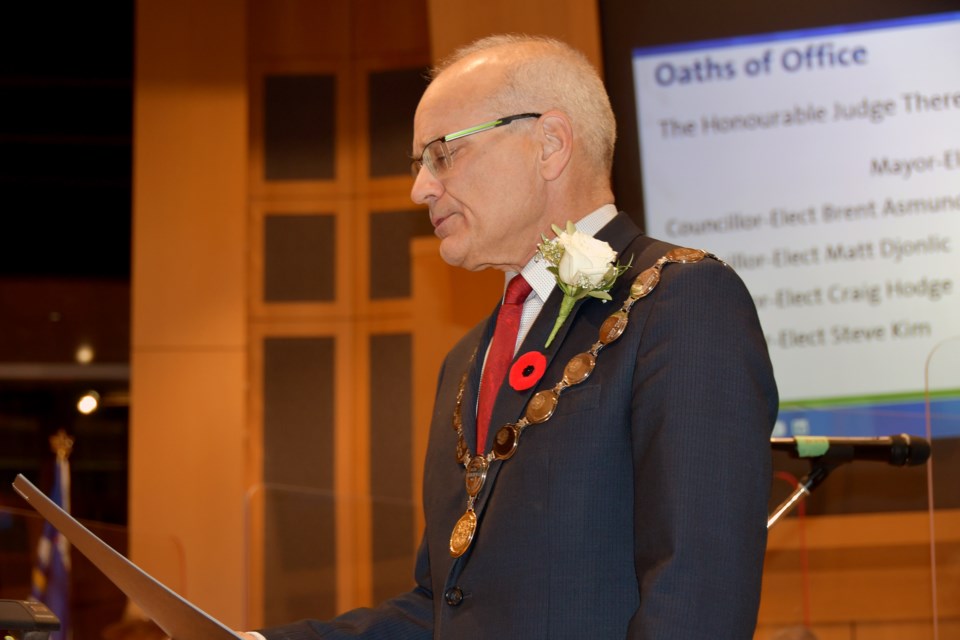There were always supposed to be two parts to B.C.’s municipal housing strategy: the carrot and the stick.
The stick has been in wide use since 2023, when the province began whacking municipalities with binding targets and deadlines on housing construction. But the carrot? Well, that promised financial aid for roads, water, sewers, transit and other critical infrastructure never quite materialized.
The latest to express frustration at the BC NDP’s ‘beatings will continue until morale improves’ municipal housing strategy is Coquitlam Mayor Richard Stewart. His fast-growing community was one of 10 hit with government housing targets last week, part of a growing list of 40 towns and cities. In an op-ed posted on the City of Coquitlam’s website, Stewart said he originally supported Premier David Eby’s housing target legislation in 2022, with the idea that the province would be there as a financial partner on everything from roads, to water, transit, schools and hospitals needed to support a growing population.
That didn’t happen.
“Today our classrooms are overcrowded, families face shortage in child care, and Coquitlam remains the only B.C. municipality of our size without a hospital or urgent care centre,” the mayor wrote. “Transit is also falling behind our growth.”
Provincial funding was supposed to be an incentive for municipalities to step up housing approvals during a time when the Eby government was blaming them for slow-playing permits and caving to not-in-my-backyard neighbourhood associations.
“Those communities that exceed those targets, (the) provincial government will be there to support you with the transportation needs, that you have the amenities, the arenas, the parks, that trails and to support that population growth,” the premier said in September 2022.
The new housing targets mandate Coquitlam build 6,481 new units over the next five years. The city exceeded that amount by 38 per cent over the last two years alone, with more than 9,000 new units. Another 26,000 new units are in the pipeline, as well as more than 5,000 purpose-built rentals, said the mayor.
“These are real results, achieved without provincial directives,” wrote Stewart.
“Which raises an important question: if the province acknowledges Coquitlam has been doing a ‘good job,’ why issue a housing target order at all? The challenge isn’t approving homes. It’s ensuring they can be built and supported.”
Coquitlam forecasts it needs $1.1 billion in new schools, $1.8 billion in transit and $228 million in child care to accommodate the population growth brought in by additional housing over the next five years.
Housing Minister Christine Boyle committed exactly zero dollars for any of that when slapping the city onto the so-called housing “naughty list” last week.
Part of the target is 2,252 below-market homes over five years. Stewart said that will require $1.2 billion in funding. The province hasn’t offered anything there either.
“Coquitlam is not asking the province to step back,” the mayor wrote. “We are asking them to step up — with sustained investment in their own areas of jurisdiction — the infrastructure and services that make housing growth possible and communities livable.”
Step up.
That was the BC NDP’s original call to municipalities back in 2022.
But communities like Coquitlam are still waiting for a provincial partner half as interested in actually helping them as it is in blaming them for housing affordability.
Rob Shaw has spent more than 17 years covering B.C. politics, now reporting for CHEK News and writing for The Orca/BIV. He is the co-author of the national bestselling book A Matter of Confidence, host of the weekly podcast Political Capital, and a regular guest on CBC Radio.
🚨New newsletter alert! Stay ahead of the curve in B.C. politics. Get expert political analysis delivered straight to your inbox, plus inside scoops and other stories from across the province. Sign up here for the Capital & Coast newsletter.




